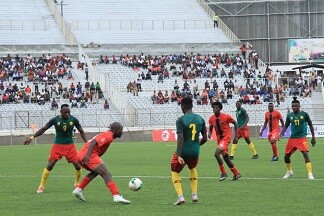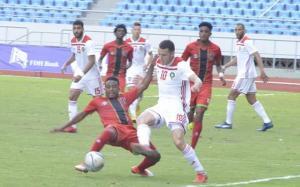
The Flames wound up their 2019 Afcon campaign with a drab stalemate in a dead rubber contest against Morocco in Lilongwe.
Overall, Flames won once, drew twice and lost thrice in 6 qualifiers thus amassing a paltry 5 points. But there is more intelligence to be derived from these raw statistics than meets the naked eye.

This article analyses Flames results in comparison to those obtained in other Groups in order to gauge Flames relative strength and weaknesses on a continent-wide basis.
The aim is to assist policy makers and the technical officials identify the problem areas which require remedial measures in order to enhance future qualification prospects.
Background
Forty eight African nations were drawn into 12 groups of 4 each. Flames were handed a tough draw and placed in Group B together with 5 time Champions Cameroon (Indomitable Lions) and World Cup candidates as well former Afcon Champions Morocco (Atlas Lions) as well as minnows Comoros who have never qualified for Afcon.
Initially, only 16 teams were supposed to qualify being the 12 group winners and 4 best runners up excluding initial hosts Cameroon. However, a decision by CAF to expand the tournament from 16 teams to 24 teams changed the qualification format mid-way during the qualifiers. Under the new arrangement, all group winners and runners up would go through.
Points Tally
Both Morocco and Cameroon amassed 11 points. Similarly, Flames and Comoros were tied on 5 points. Application of head to head tie-breakers meant that the Atlas Lions finished at the summit as they beat the Indomitable Lions 2-0 in Rabat in the return leg although they had earlier lost 0-1 in Yaounde. Malawi edged Comoros to finish third. Although the head to head result stood at 2-2 the away goal scored by Patrick Phiri in the 1-2 defeat put Flames in good stead than Comoros.
13 out of the 47 teams (or 28% of the teams) including Flames failed to obtain more than 5 points. Notably all these 13 sides failed to qualify namely Botswana, Cape Verde ,Comoros, Congo, Eswatini, Ethiopia, Malawi, Niger, Rwanda, Seychelles, South Sudan, Sudan and Togo. Only 7 teams obtained fewer than the 5 points collected by Flames with South Sudan losing all fixtures and failing to get off the mark.
The remaining 34 teams (or 72%) obtained 6 or more points. However, not all the 34 that amassed more than 6 points eventually qualified.10 (21%) teams that collected at least 6 points failed to qualify namely Burkina Faso, Central African Republic, Equatorial Guinea, Gabon, Gambia, Lesotho, Liberia, Libya, Mozambique and Zambia.
In fact Burkina Faso is the only team in this category of non-qualified teams whose points tally went to double digits as they finished their campaign with 10.
18 out of the 24 qualified teams managed to secure 10 or more points. Put simply, 75% of the qualifying berths were snapped up by teams with at least 10 points namely Algeria, Angola, Benin, Burundi, Cameroon, Egypt, Guinea, Ivory Coast, Madagascar, Mali, Mauritania, Morocco, Nigeria, Senegal, South Africa, Tunisia, Uganda and Zimbabwe. Senegal led the elite pack amassing the highest number of points being 16.
The remaining 6 teams or 25% of the qualified teams scrapped through with less than 10 points namely DRC, Ghana, Guinea Bissau, Kenya, Namibia, and Tanzania. Kenya qualified with the least number of points, a meagre 7 but sight ought not to be lost of the fewer number of matches they played due to Sierra Leone’s exclusion.
All the Flames’ 5 points were collected at home as they lost all away fixtures thus registering nil points in their travels. All 24 teams that qualified picked at least a point away from home with Senegal leading the pack with 7 points from their sojourns avoiding defeat during the entire qualifiers.10 teams (Angola, Benin, Cameroon, Egypt, Ghana, Kenya, Mauritania, Morocco, Senegal and Tunisia) that qualified won all home matches whereas only 4 (Nigeria, Ivory Coast, DRC and Madagascar) tasted defeat once at home. Thus 20 teams that qualified never lost at home as another 10 teams which did not win all home games were still unbeaten on home turf.
Goals Scored: overall, home and away.
Flames were the lowest goal scorers in Group B as all their opponents converted no fewer than 5 times. Overall, the 2 goals Flames scored puts them at par with Eswatini and South Sudan who failed to qualify whereas Egypt were the overall highest goal scorers with 16 goals. Only Botswana scored an inferior number of goals than Flames managing a solitary goal in the entire qualifiers.
Thus 43 teams involved in the qualifiers scored more goals than Malawi representing 91.4%.Although Ethiopia failed to score at all, they played 2 games less than the rest of the teams as Sierra Leone withdrew from the tournament; thus Malawi only bettered Botswana in the goal scoring department.
Malawi were consigned into oblivion and thrust into a minority and blunt group of only 3 teams out of the 47 that played 6 matches and scored not more than twice.
Both Flames goals came against Comoros split evenly between the home and away fixtures. At home, Flames scored once from Gerald Phiri’s set piece and failed to convert during open play at all whereas Patrick Phiri scored the only away goal.
Namibia scored the least goals at home amongst the qualified teams finding the net only twice. The rest of the qualified teams scored at least 4 times with Egypt leading the pack with 13 strikes in the home fixtures.
Yet Kenya and Tanzania went through without even scoring a single away goal although Kenya played only 4 games due to Sierra Leone’s withdrawal. Nigeria were the highest away scorers managing 7 goals.
Goals conceded: overall, home and away
Every team conceded away from home. Mali and South Africa had the meanest defences in away fixtures conceding once only. Kenya and Ghana also conceded once away but they played 1 game less than the remainder of the teams. Seychelles however conceded the most away goals totalling 14 with Rwanda in hot pursuit joining them into double figures with 10 let in away from home.
Overall, Flames conceded 6 goals all away from home. At home Flames maintained a clean sheet in all 3 fixtures. In Flames group B Cameroon and Morocco also never conceded at home. Only 8 teams in the entire qualifiers achieved this feat representing 17%.Except Flames, all teams that did not concede at home qualified namely Senegal, Cameroon, Morocco, Tunisia, Uganda, Ghana and Kenya although the latter 2 played only 2 matches at home instead of 3.Thus 39 teams or 82% of teams involved in the qualifiers conceded at home and 18 or 75% of the qualified teams had their defines breaches during home fixtures. Malawi’s uniqueness lies in the record that it is the only team that did not concede at home amongst all the sides that failed to qualify.
27 out of the 47 teams that qualified conceded 6 or more goals. Thus only 20 teams conceded fewer goals than the Flames. The majority of the teams conceded equal to or greater than the 6 goals Flames let in. Roughly 60% of the teams conceded at least 6 goals. Clearly, the defensive performance of Flames is not at variance with most African teams conceding an average of 1 goal per game.
Results (win, draw and loss)
The Flames report card is hardly satisfactory registering 1 win, a couple of draws and three defeats as earlier noted. In Malawi’s group no team managed to win away at all. Tunisia’s and Senegal’s 5 wins apiece were the highest in the entire qualifiers as no team managed to win all 6 qualifiers.6 teams(Botswana, Eswatini, Seychelles, Ethiopia, Rwanda and South Sudan) failed to win at all and of course failed to qualify. All the 24 qualified teams won a minimum of 2 matches and picked up at least an extra point.
10 or 41% of the qualified teams(Angola, Benin, Cameroon, Egypt, Ghana, Kenya, Mauritania, Morocco, Senegal and Tunisia ) had a 100% home record winning all 3 of their matches.17 or 70% of the qualified teams (Algeria, Angola, Egypt, Ghana, Ivory Coast, Kenya, Madagascar, Mali, Mauritania, Morocco, Namibia, Nigeria, Senegal, South Africa, Tunisia, Uganda and Zimbabwe) won at least 1 match away from home whereas only 7 non-qualified teams (Equatorial Guinea, Gabon, Libya Mozambique, Niger, Sudan, and Togo) ever fetched maximum points in their away assignments.
All teams in Flames group drew twice. Three of the qualified teams (Angola, Mauritania and Tunisia) never drew at all. They either won or lost. Ghana also falls in this category although it played 2 games less.2 teams that failed to qualify also never drew a match namely Equatorial Guinea and Sudan. Thus 41 or 87% of the teams in the qualifiers played a draw in at least 1 match.
All 4 teams in Malawi’s group B lost away at least once.5 teams (Burundi, Guinea, Mali, Senegal and South Africa) were undefeated throughout the qualifiers and went through. The rest tasted defeat.4 or 16% of the qualified teams (DRC, Ivory Coast, Madagascar and Nigeria) lost 1 game at home.8 qualified teams (Burundi, DRC, Guinea, Ivory Coast, Mali, Nigeria ,Senegal and South Africa)did not suffer any defeat in their away fixtures at all. All the 23 non-qualified teams suffered defeat at least once in their away fixtures but only South Sudan lost all 6 fixtures.
Conclusion
The data shows Flames can significantly improve its chances of qualifying if it collects at least 11 points in round-robin group games comprising 4 teams where the top 2 are designated to qualify. Chances of qualifying with fewer than 11 points are slimmer. Inevitably, Flames must learn to pick points in both home and away fixtures by scoring regularly.
Avoiding defeat at home does not suffice but only wins will do; we must collect maximum points when playing at our backyard rather than draw the majority of the fixtures. Clean sheets without us scoring won’t come to our aid either. A loss is not so bad news as redemption remains a realistic prospect even after defeat.
Be that as it may, a kinder draw could also operate to lower the requisite points threshold as was the case in Group K comprising Guinea Bissau, Mozambique, Namibia and Zambia where 9 and 8 points were adequate for qualification; Similarly the fortuitous withdrawal of Sierra Leone in Group F lowered the bar enabling Ghana’s and Kenya’s progression with under 10 points.
RVG is far from being the perfect coach, if ever there is one, but we must open our minds to an objective assessment of the results.
It would have been a different story if Flames were perennial qualifiers and all of a sudden failed to qualify. We are no world beaters having qualified only twice in over 20 attempts representing less than 10 % success rate.
*In depth analysis of Flames’ Afcon qualification campaign by Lawyer David Kanyenda*














